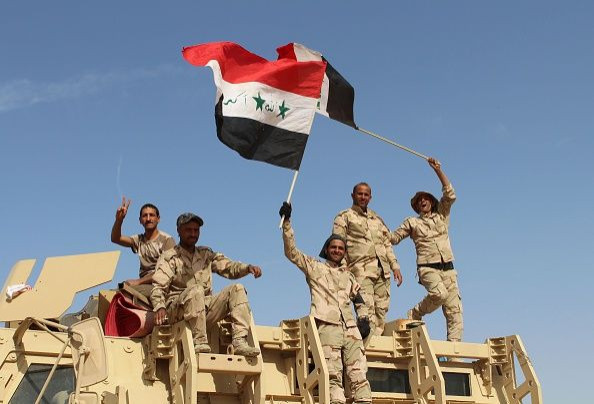Iraqi Security Forces, Anbar Tribes Launch Operation Desert Lynx To Liberate Hit

Iraqi Security Forces and the country's Sunni tribes in Anbar province on Saturday launched a new offensive, Desert Lynx, to liberate towns and villages along a 38-mile stretch of road in the west. If successful, the offensive would allow the Iraqi forces to focus on controlling Haditha, a city frequently targeted by militants, while also clearing towns on the road to Baiji, one of the country's oil epicenters. The operation will take place under the cover of an international coalition's airstrikes.
"All western areas in the province will experience battles in the next few days as we attempt to liberate them," said Suhaib al-Rawi, governor of Anbar province, in the local media. "We will push out the terrorists from Hit."
#Iraq Security Forces , #Euphrates River Valley activity
— Mete Sohtaoğlu (@metesohtaoglu) March 3, 2016
_ pic.twitter.com/yb6m2Nensx
Operation Desert Lynx comes two months after Iraqi Security Forces liberated Ramadi from the Islamic State group, also known as ISIS or ISIL. Since their victory in Ramadi, the Iraqi forces have had difficulty defeating the militant group elsewhere in the province, suggesting that millions of dollars the U.S. is spending on engaging and training Sunni tribesmen may not be working. Brett McGurk, the U.S. special envoy for the fight against ISIS in Iraq and Syria, said in February that U.S. special forces are working with as many as 10,000 tribesmen in Haditha to defeat ISIS and that they were "gaining capacity." But since then, the forces on the ground have not defeated the militant group in any strategic areas.
Operation Desert Lynx could determine the success of U.S. strategy on the ground in Iraq, but the outcomes of recent battles launched by Iraqi forces have not been promising.
Pressure on #ISIL and its leadership will continue to accelerate from all directions -- north, south, east, west -- across #Syria & #Iraq.
— Brett McGurk (@brett_mcgurk) March 11, 2016
In Fallujah, another major battleground in Anbar province just outside the captial of Baghdad, ISIS is still holding ground. Iraqi security forces liberated Ramadi earlier this year and vowed to also retake Fallujah, but so far ISIS has maintained its grip on the city. Thousands of people are still living in the besieged area, and many report they are being starved by ISIS. Sunni tribesmen there are taking up arms in an effort to defeat the militant group, but a lack of weapons and ammunition, as well as international support, is limiting their success. As a result of the internal uprising ISIS last month captured more than 100 people. Tribal leaders in Fallujah warn that if their fighters did not receive the weapons needed to fight ISIS, hundreds of people would die.
In Haditha, an area about 120 miles northwest of Baghdad, Iraqi Shiite volunteer forces are barely hanging on. ISIS attacks troops protecting the dam there almost daily. A senior Iraqi army officer and seven others were killed overnight when ISIS militants attacked a military headquarters near the town March 1.
Four suicide bombers attacked an entrance to the Iraqi forces' base in Haditha and clashed with soldiers, killing Brig. Ali Abboud, the command's chief of staff. ISIS said in an online statement that day that two of its fighters had infiltrated a police headquarters near Haditha dam and attacked soldiers stationed there with light weapons and hand grenades before detonating explosive vests.
Tens of thousands of Iraqis evacuated their homes over the weekend as the Iraqi forces launched Operation Desert Lynx. The U.S.-lead coalition dropped two bombs on ISIS facilities in Hit on Friday as part of the operation.
© Copyright IBTimes 2024. All rights reserved.





















